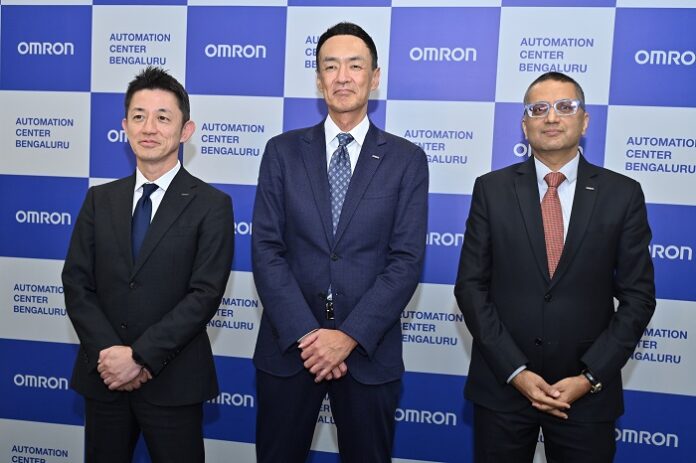
Omron, a global leader in industrial automation, recently inaugurated its new Automation Centre in Bengaluru, marking a step forward in its plan to drive automation-led transformation in India’s manufacturing sector.
Speaking to Packaging South Asia during the inauguration on 8 October, Motohiro Yamanishi, managing executive officer, company president, Industrial Automation Company, Omron Corporation, and Sameer Gandhi, managing director, Omron Automation India, discussed the company’s investment approach, collaboration priorities, and long-term outlook for India’s manufacturing sector.
Strategically located to serve manufacturers across South India and other regions, the Bengaluru facility joins Omron’s global network of 10 Automation Centres. The centre aims to support manufacturers—including micro, small and medium enterprises (MSMEs)—in adopting automation and digital manufacturing practices that enhance productivity, safety, and sustainability.
Supporting the government’s Make in India and Industry 4.0 initiatives, the centre will demonstrate integrated automation solutions, facilitate proof-of-concept development, provide technical training, and encourage collaboration among machine builders, system integrators, and technology partners.
Yamanishi said the new facility reflects India’s increasing importance in Omron’s global and Asia-Pacific operations. He explained that Omron’s current focus is on product development and data-based solutions designed to improve production efficiency and strengthen customer stability. These efforts align with the company’s broader objective of supporting sustainable manufacturing through intelligent automation and digital transformation.
Gandhi said the Bengaluru centre functions as an interactive space for industrial customers to explore how Omron’s hardware, software, and systems integrate to deliver automation solutions. “The centre is designed to allow customers to test technologies relevant to their operations and understand their potential before implementation,” he said. Gandhi added that the facility is expected to play an important role in addressing hesitation around automation adoption caused by concerns over investment returns.
The centre also presents demonstrations of collaborative robots (cobots) and autonomous mobile robots (AMRs) that show how humans and machines can work together safely and efficiently in palletizing, assembly, and inspection tasks.
Yamanishi highlighted the packaging sector as a key focus area for Omron, noting that the company is collaborating with machine manufacturers to address sustainability and regulatory challenges. He said Omron is co-developing applications that support precision and adaptability for new packaging materials and environmental standards.

On Omron’s broader investment approach, Yamanishi said India offers both growth and learning opportunities. “The competitive environment allows us to improve cost efficiency and adapt global solutions for local needs,” he said, adding Omron will continue to invest in system engineering, automation solutions, and workforce development.
The opening of the Bengaluru centre coincides with deepening India-Japan collaboration in technology, skills, and supply chain resilience. With Japan committing ¥10 trillion in investments over the next decade across sectors including semiconductors, digital industries, and sustainable technologies, Omron’s new centre contributes to this shared goal of advancing smart manufacturing and innovation.
Omron Automation India has recorded steady growth, maintaining a CAGR of more than 15% since 2013 and exceeding 20% in the past three years. The company targets continued growth above 15% CAGR and expects to reach a turnover of Rs 600 crore in FY2025–26. The new centre will play a role in meeting these goals while supporting skills development for over 1,000 engineers each year.
Located about an hour from Kempegowda International Airport, the centre showcases Omron’s technologies in sensing, control, machine vision, safety, robotics, and AI-driven systems, developed with both global and regional partners.
Among the highlights is an IT–OT convergence solution developed with Cognizant, which converts machine data from Omron PLCs, sensors, and robots into actionable insights using Cognizant’s APEx cloud platform powered by generative AI. The solution provides real-time analytics, predictive maintenance, and defect detection to support data-driven decision-making.
The centre’s applications cover industries including electric mobility, electronics, food and beverages, logistics, pharmaceuticals, and fast-moving consumer goods. Demonstrations of Industry 4.0 solutions—such as flexible assembly, packaging, perfect sealing, end-to-end inspection, and quality control—illustrate how automation can help manufacturers improve efficiency, traceability, and compliance.
Yamanishi said India remains a growth engine and capability hub for Omron, with the new centre representing a long-term investment in sustainable and technology-driven manufacturing. Gandhi added that the facility will act as a platform for collaboration, bringing together technology and industry expertise to encourage innovation within India’s manufacturing ecosystem.










